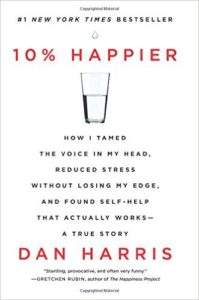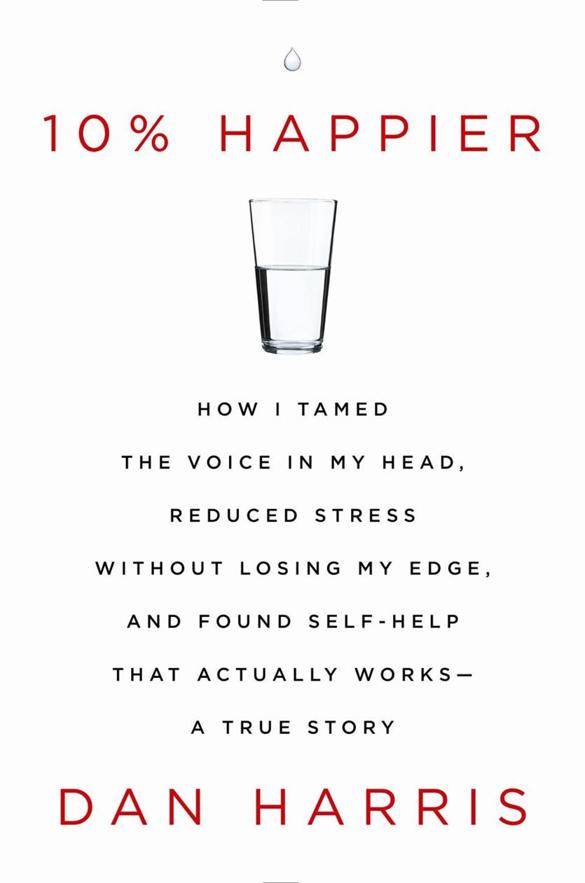If you’ve been following my vlogs, you’ll know that I’ve been experimenting with incorporating meditation into my daily morning routine. I find that meditation helps increase my emotional awareness and make me happier!
 That’s one of the reasons that I picked up this book, 10% Happier: How I Tamed the Voice in My Head, Reduced Stress Without Losing My Edge, and Found Self-Help That Actually Works–A True Story. I had also heard about this book on the School of Greatness podcast, one of my favorite podcasts!
That’s one of the reasons that I picked up this book, 10% Happier: How I Tamed the Voice in My Head, Reduced Stress Without Losing My Edge, and Found Self-Help That Actually Works–A True Story. I had also heard about this book on the School of Greatness podcast, one of my favorite podcasts!
Overall, I think that this book is a good introduction to meditation, especially if you’re a skeptic. Dan Harris has a compelling story that pushes the narrative forward. He sprinkles in bits of information about meditation and his own discoveries as he learns more and more about the practice.
I enjoyed how real the book is. I gotta be honest, I think quite similiarly to Harris when it comes to some of the “spiritual gurus” in our society. A lot of them are complete bullshit. Harris doesn’t sugarcoat his thoughts. He shares his takaways, whether they are positive or negative.
Other Amazon readers didn’t seem to like this story-based approach. One left a review saying, “I found the book interesting at the beginning. However, the author’s personality really began grating on me. The guy really is a narcissistic, self-absorbed jerk. I don’t think meditation had any effect on him whatsoever.”
Another said, “Just get a book an meditation. 10% information, 90% author’s career story. Readable but just barely. It would help to be a fan of the author. Part about retreat was interesting…”
I agree that if you’re looking for a step-by-step practical guide to meditation, this is not the book for you. If you’re looking to get a bit of info about meditation and how it can help you, I think it’s a great book. I also resonated with many of the harmful internal beliefs that Harris had when it came to work. I used to think very similarly and am working hard to change those negative thought loops.
If you want to check it out, you can purchase the book here. I’ll be sharing some of my notes on the book and takeaways beow.
Notes and Takeaways
“You create little spaces in your daily life where you are aware but not thinking.” – Eckhart Tolle
“Make the present moment your friend rather than your enemy. Because many people live habitually as if the present moment were an obstacle that they need to overcome in order to get to the next moment. And imagine living your whole life like that, where always this moment is never quite right, not goo enough because you need to get to the next one. That is continuous stress.” – Eckhart Tolle
“As one buddhist author put it, the ‘craving to be otherwise, to be elsewhere” permeated my whole life.”
“In a nutshell, mindfulness is the ability to recognize what is happening in your mind right now – anger, jealousy, sadness, the pain of a stubbed toe, whatever – without getting carried away by it.”
“The nonjudgmental noting – oh, that’s a blast of self-pity… oh, that’s me ruminating about work- is supposed to sap much of the power, the emotional charge out of the contents of consciousness.”
“Habitutal mindless chain reaction.”
“Public health revolutions can happen quite rapidly. Most Americans didn’t brush their teeth, for example, until after World War II, when soldiers were ordered to maintain deal hygiene. Exercise didn’t become popular until the latter half of the twentieth century, after science had clearly shown its benefits. In the 1950s, if you had told people you were going running, they would have asked who was chasing you. The difference with meditation was that if it actually took hold, the impact would go far beyond improving muscle tone or fighting tooth decay. Mindfulness, I had come to believe, could in fact, change the world.”
“Do it [ good things] because it would redound to your own benefit, that it would make you feel good by eroding the edges of the ego. Yoked to self-interest, the compassion thing suddenly became something I could relate to- maybe even something I could do.”
“Practice for development of concern for well-being of others, that actually is immense benefit to oneself. Practice of compassion is ultimately benefit to you.” – Dalai Lama
“Everyone wants the same thing – happiness – but we all go about it with varying levels of skill.”
“Turns out, it’s pretty simple to win people over, especially in tense situations, if you’re able to take their perspective and validate their feelings. Once they like you, you are more likely to do you favors.”
We should seek a balance between buddhist principles and ambition.
